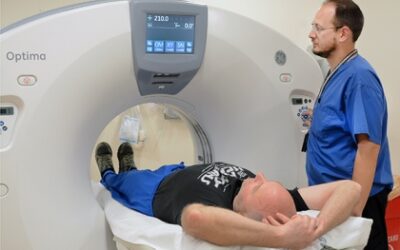A study from the VA and U.S. military research organizations addresses the question of how a diagnosis of pulmonary hypertension (PH) affect survival in patients with non-small cell lung cancer (NSCLC).
Highlights of the VA’s Contributions to Cancer Research
In the more than 90 years since the VA established its first tumor research laboratory at the Hines, Ill., VA hospital, the agency has published some of the most instrumental studies in cancer in the U.S.
In Advanced NSCLC, Frail Patients Receive Less Intensive Treatment Even If Performance Status Isn’t Poor
Immune checkpoint inhibitor (ICI) monotherapy is often preferred over intensive ICI treatment for frail patients and those with poor performance status (PS) in advanced non-small cell lung cancer (NSCLC).
KRAS G12C in Veterans with NSCLC Has Favorable Outcomes Compared to Non-G12C Variants; Availability of Sotorasib Treatment Credited
KRAS mutations have historically carried a poor prognosis in NSCLC, and the most common variant, G12C, had similar suboptimal survival compared to non-G12C variants. That has changed with the approval of new KRAS G12C inhibitors.
Is VA Avoiding Reporting Requirements in Supply Chain Modernization?
Lawmakers on both sides of the aisle are upset at VA for delays in providing Congress with information about its ongoing Supply Chain Modernization (SCM) project.
Congress member Calls for McDonough Resignation Over Questionable Bonuses
VA Secretary Reminds Committee He Sought Investigation WASHINGTON, DC—A member of the House VA Committee has called on VA Secretary Denis McDonough to resign over the nearly $11 million in bonuses inappropriately paid to senior VA Central Office (VACO) officials....
Huge Financial Impact From Lapses in, Misuse of VA Prime Vendor Program
A recent audit of VA’s Medical Surgical Prime Vendor Program (MSPV) found that lack of oversight of the system, which is meant to save VA money by better leveraging the department’s buying power, is costing VA hundreds of millions a year.
COVID-19 Complications Continue to Arise Three Years After Infection
The long-term effects of COVID-19 might last longer and manifest themselves later than was previously thought, according to a new study that followed patients for three years after their initial illness.
New Research Finds Service Dogs Beneficial for Veterans With PTSD
The VA covers the veterinary care and the equipment costs of service dogs for veterans with physical disabilities such as blindness or vision impairment, but the use of service dogs for veterans with post-traumatic stress disorder (PTSD) and other mental health issues has remained controversial.
Recurrent Hyperkalemia Found to Be Higher in Black, Hispanic Veterans
In U.S. veterans with incident hyperkalemia, the risk of recurrent hyperkalemia within one year is higher in Black and Hispanic patients, according to a recent study.
Supplements Marketed to Military Contain Dangerous, Illegal Substances
Dietary supplements for weight loss are widely promoted online and through social media, with many claiming to have the added benefits of building lean muscle and enhancing energy and performance.
Fewer Deaths After Serious Illness in Veterans Treated With PARC Care Model
After a serious illness, veterans who received medical care via the Post-Acute Recovery Center (PARC) model experienced fewer deaths and more days outside of the hospital compared to those not treated with PARC, according to a recent study.
Real-World VA Study Shows Substantial Mortality Benefit From Lung Cancer Screening
Veterans who underwent VHA lung cancer screening were more likely to be diagnosed at an earlier stage and had higher cure rates than those who were not screened, according to a new observational study.
Prospective Memory Deficits Explained in Multiple Sclerosis Patients
Patients with multiple sclerosis (MS) have been found to have prospective memory (PM) deficits. A new study sought to better understand how and why that occurs.
Exposure to Agent Orange Associated With Increased Prostate Cancer Risk
In veterans who were on active duty during the Vietnam War era, exposure to Agent Orange was associated with a small increase in the risk of developing prostate cancer, but not metastatic prostate cancer or fatal prostate cancer, according to a recent study.
Veterans With MS Face Disparities in VA Smoking-Cessation Treatment
Even though smoking is a risk factor for multiple sclerosis (MS) development, symptom burden, decreased medication efficacy and increased disease-related mortality, veterans with the disease continue to smoke at critically high rates, according to a new study.
Why Does Epstein-Barr Lead to Multiple Sclerosis in Some Patients?
Only a small proportion of patients infected with the Epstein-Barr virus (EBV) develop multiple sclerosis (MS). A new military study sought to determine why that is and what the underlying mechanisms are.
In a Turnaround, Nearly All VA Hospitals Require Personnel to Get Flu Shots
In 2017, almost no healthcare personnel at VA hospitals reported in a survey that they had received mandatory influenza vaccinations. By 2021, almost all VA respondents said they had.
Processing of ICE Medical Claims by VA Sparks Controversy in Congress
The U.S. House of Representatives has approved an amendment to H.R. 8580, the Military Construction and Veterans Affairs, and Related Agencies Appropriations Act to prohibit the VA from processing claims for the Immigration and Customs Enforcement (ICE) Health Service Corps at the Department of Homeland Security.
Sacubitril/Valsartan Not Linked to Higher Dementia Rates in HF Patients
Could using the drug combination sacubitril/valsartan, an angiotensin receptor/neprilysin inhibitor, in heart failure patients increase their risk of cognitive impairment?
Influenza Associated With Coronary, Cerebrovascular Events in Older Veterans
Influenza is a significant contributor to coronary and cerebrovascular events in U.S. veterans and exacerbates underlying conditions, according to a new study.
Kidney Disease Defined by KDIGO Guidelines Riskier for Veterans With HF
Is chronic kidney disease (CKD) diagnosed based on a single estimated glomerular filtration rate measurement significantly different from that diagnosed using the Kidney Disease: Improving Global Outcomes (KDIGO) guideline?
Olfactory Function Loss in GW Veterans Linked to Cognitive Deficits
A disorder related to military service in the 1991 Gulf War (GW), Gulf War illness (GWI)/Chronic Multisymptom Illness (CMI), includes symptoms such as fatigue, pain and cognitive dysfunction.
Guideline Discordant Care Leads to Lower NSCLC Survival in AI/AN
American Indian/Alaska Native (AI/AN) patients have lower overall survival rates from non-small cell lung cancer (NSCLC), and at least part of the reason is that they are less likely to receive guideline-concordant care, according to a new study.
Mutant HRAS-Driven BC Tumors More Linked to Skeletal Muscle Dysfunction
The quality of life for many breast cancer patients is affected by skeletal muscle dysfunction, which is estimated to appear in about 39% of cases.
Red Flag Signs, Symptoms Could Mean Early-Onset Colorectal Cancer
Colorectal cancer is one of the most common cancers in the United States and worldwide, with about 4,000 cases diagnosed each year in the VA alone. While the rate of colorectal cancer among older individuals—who traditionally were at greatest risk—has decreased in recent years, the incidence in younger people has been increasing at an “alarming rate,” according to a recent study.
Using ‘Colon Age’ to Determine Cancer Screening for Veterans Younger Than 50
A new metric, so-called colon age, has been developed to help estimate the risk for early-onset colorectal cancer (EOCRC) in male veterans.
Sen. Elizabeth Warren’s Letter: Constituents Frustrated With VA Disability Exams
Veterans are reporting disability exam experiences with third-party contractors that are “inadequate and unprofessional,” and it has a leading Democratic senator asking what the VA plans to do about it.
Skin Disorders Such as Atopic Dermatitis Can Have Extracutaneous Effects
Aging can lead to the development of cutaneous symptoms and disorders, and in many older adults the effects often are not limited to the skin, according to a new VA study.
Advocates Warn VA’s Spinal Cord Injury Hub System Is In Danger of Collapse
The Spinal Cord Injury and Disorders (SCID) system, the hub-and-spoke model of care that VA uses to treat some of its most vulnerable veterans, is in danger of collapse, veterans’ advocates are telling lawmakers. According to them, the system is under-financed and understaffed, with patients being turned away because of the lack of resources.







